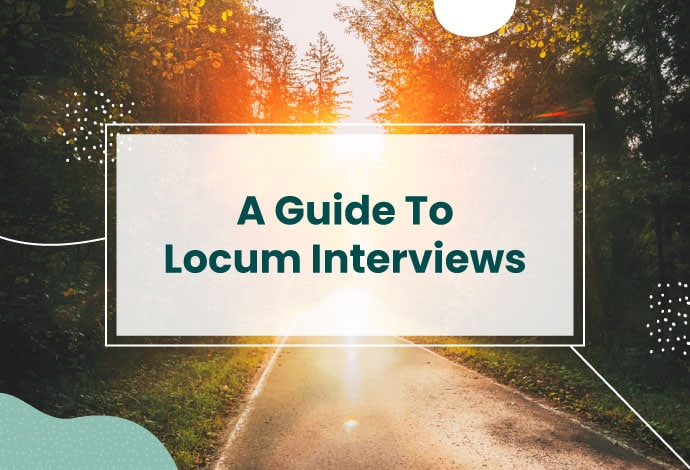A Guide To Locum Interviews In Australia
Interview questions, tips & stress-free preparation
In the locum job market, it can feel like there is always an abundance of locum roles available, with job boards showcasing a variety of locum jobs across Australia. With a multitude of opportunities in beautiful locations and dates to pick from, most locum doctors are spoilt for choice!
If you’ve worked in locum roles before, you might not have ever needed to have a locum interview. And perhaps after many years on the circuit, your interview skills were put out to pasture prior to becoming a consultant doctor. For short term locum roles, there usually just isn’t time for an interview. The role needs to be filled right now, so interviews aren’t part of the recruitment process. Providing your skills meet the essential criteria, and you have the right credentialing documents in place, you’re likely to get the job. Snap!
But it may come as a surprise to you to learn this is not always the case.
What you may not realise is that sometimes the most standout locum roles are so hot they don’t even need to be advertised to be filled. And with a shortlist of applicants ready to go the role can quickly become highly competitive.
For the standout roles in select clinical settings, with sought-after benefits or roles with high quality organisations, interviews may in fact be required. Similarly, in scenarios such as ongoing FIFO placements, longer term locum roles (up to 6 months) or fixed term contracts in a specialty teaching hospital a locum interview can form part of the recruitment process.
And the absolute worst thing you can do is be unprepared for a locum interview!
Whether you’re a specialist locum doctor, a locum GP or a generalist looking for locum work for the first time, making a good impression at your interview is vitally important – even if you weren’t expecting to have an interview at all. Thankfully, you’re in the right place…
We’ve been helping people secure coveted locum jobs for ages, so we know exactly what interviewers are looking for and what you can do to secure that role.
Locum interviews are a two-way street
It’s easy to think that interviews are one-way: the interviewer is interviewing you, and the pressure is on you to make the best possible impression.
But it’s important to remember that it’s an opportunity for you to interview them too!
Whether a locum role is a good fit is mutual. The hospital or practice needs to understand what you can bring to the role, but you also need to get a good sense of whether the role is right for you too. After all, as a medical professional your committing a huge number of hours to the role, so it makes sense to make sure it will be good for you.
At Salt, we always encourage an informal interview between you and the client (hospital or practice) before committing to a longer locum placement or a fixed term contract, because we’ve seen first hand how important culture-fit and personality-fit can be – particularly in the incredibly high-pressure environments that locums work in.
Having a positive first encounter with your potential employer makes it far more likely that your locum placement will be successful and the right fit for you – which is a good thing for everyone involved!
Make the most of your recruiter (that’s us!)
Your recruiter is there to help!We believe we are here to support you professionally and we want you to do the best you possibly can at the locum interview. So make the most of our expertise, support and insider knowledge prior to your interview.
Obviously, your recruiter should be the one who provides all the logistical details for your interview. Where it is, when it is, whether it’s a phone call, a Zoom meeting or in-person. If your recruiter isn’t giving you that information, then they’re definitely doing something wrong…
But don’t stop there!
There’s a whole lot more that your recruiter can help you with too when you’re preparing for your locum interview.
Other helpful information your recruiter may be able to provide you with before your interview includes:
- The names and positions of the people involved in the interview: this can be really valuable for your preparation! If you know who you’re being interviewed by, what their specialism is and what their role in the practice or hospital is, you’ll be able to more easily predict and prepare for the questions they might ask. Do a little bit of research into the people, but we wouldn’t recommend going full-hog stalker mode!
- How long the interview is likely to be: this might feel like an insignificant piece of information; it’ll be as long as it takes, right? But if you know that the interview is short, it’s likely to mean quick-fire questions – and less time to make a good impression. If you know it’s a longer interview, it’s likely to need more in-depth responses and a little bit more prep than a shorter one. It’s not an exact science, but it’ll help to give you a nudge in the right direction!
- How many other candidates are being interviewed for the role? If it’s a highly-coveted locum placement or a fixed term contract in a large specialist hospital, it may be a competitive role. If you’re used to not having to compete for a locum role, it might surprise you to hear that you’re not the only candidate – but if your recruiter can give you an indication of how many other candidates are vying for the role, you’ll at least be able to set your expectations realistically!
Do your research
When attending your interview, preparation is KEY. But you already know that. What you want to know is how you can prepare for your interview – for one of the more competitive locum roles in Australia. So here we go.
The employer
While hospitals and practices across the country follow similar procedures and similar processes, there’s always something slightly different about every organisation. It’s impossible to know exactly what a healthcare provider is like before working there, but we’d suggest doing a little bit of investigating beforehand. Check the practice or hospital’s website to understand what their priorities are, read any reviews or feedback you can find online (check Glassdoor for employee feedback or Google for patient feedback), and do a bit.Know why you’re needed
The reason a hospital or practice is looking for a locum doctor, particularly for a longer-term locum placement, can give you a better understanding of what the role will need from you – and help you to better convey what you can bring to the table. For example, you might be interviewing for a 6-month placement in a specialist tertiary hospital , where a permanent vacancy has been left unfilled for an extended period of time. In this case, you’ll be being brought in to relieve the pressure on the rest of the team who have been carrying that extra burden since the permanent vacancy came up. Here, you’ll want to emphasise how you can work effectively in teams, and how you can hit the ground running as soon as possible. Alternatively, you might be interviewing for a 6-month placement in a solo rural generalist setting, where you’re being brought in to cover holiday periods. In this case, you’ll want to emphasise how you are capable of working autonomously, how quickly you can get to grips with the hospital’s processes and systems, and how you can provide a high-quality service in a remote setting. In every case, you need to be confident in your abilities and your skills. In the wider context of the role, understanding the value you will bring and the problem that you solve can help you to position yourself and your skills in a way that makes the client jump at the chance to bring you on board.Create your elevator pitch
Having a clear, concise round up of who you are, what you can bring to the role, and how you work can be mighty powerful. It sets the tone right at the start of the interview and helps both you and the interviewer to get right into the good stuff as soon as possible. It also puts you in the driving seat, gives you an impactful answer to the vague “Tell me about yourself” question, and helps you to get the most important points across before the interviewer has a chance to throw in any curveball questions! When you’re putting together your elevator pitch, think about how to include these elements:- Why you chose medicine and what you specialise in
- Your career highlights (e.g. achievements, particularly enjoyable roles, etc.)
- Your most recent locum placement and any great feedback you have received
- What you can bring to this role
Locum interview questions
Having done your research for your locum interview, you’ll hopefully have a good idea of what the interview will be like and how you can demonstrate your suitability for the coveted locum role.
However, most of the fear before locum interviews comes from not knowing what questions will be asked. And while we can’t give you a conclusive list of questions to practice your answers to, we can shed some light on the sorts of questions we’ve seen come up before, so that you can feel a little more confident in knowing that you won’t be entirely blindsided!
Client locum interview questions you might be asked
- What appeals to you most about locum work in [this part of] Australia?
- What do you know about the department / organisation and how we operate?
- Can you describe your clinical background and competencies as they relate to this role?
- What’s the proudest professional achievement of your career?
- How do you handle the pressure of working in a solo / or busy clinical environment?
- Given you will be here for a long locum assignment, are you happy to mentor junior staff and get involved in teaching as required?
- Which computer systems are you comfortable using? Are you comfortable learning how to use new systems?
- Can you describe your last locum assignment? What worked well and what could have been better?
- If you get this job, what will you need from us to ensure you can hit the ground running?
Prepping your mind
If you’ve done all the research, familiarised yourself with the competencies and prepared responses to some of the possible questions, you’ve done almost everything you can to make this locum interview a success!
The last piece of the puzzle is you.
It’s incredibly important to prepare your mind for a locum interview. Even if it’s an informal process, you need to feel confident and unphased by interviews in general, a single unexpected question can throw the most unflappable of professionals off.
You know yourself better than we ever could, but here are a few tips for handling the mindset side of things in preparation for and during your locum interview:
- It’s important to be prepared for your interview, but it’s also important to not over If you overprepare, you’ll come across as scripted and you’ll be more likely to be thrown off by an unexpected question.
- During your preparation, don’t practice fully-fledged answers to possible questions. Instead, jot down bullet points. This means you’re thinking about your answers, but not so much that you’ll be reciting full sentences in your interview.
- Know your resume inside out and make sure it is the best it can be before your interview. If it’s too brief or doesn’t highlight the relevant parts of your background for this particular role, improve it beforehand. This is something your recruiter can help you with, to make sure that your CV meets the standards the employer will expect.
- Simple and obvious, but make sure you breathe! If you’re not sure how to answer a question, take a pause to breathe deeply and let your mind figure it out. Don’t start answering right away if you’re not sure what you’re going to say – just say, “Can I have a moment to think about that?” and take your time.
- Detach your worth from the outcome of the interview. It’s easy to think that if you aren’t successful in the interview, you’re not good enough. But remember that there are hundreds of other factors that determine whether or not you get the locum role. The industry can be hugely competitive and sometimes a role just isn’t quite the right match for your skills and capabilities or sometimes it’s just that someone else pipped you to the post! Detaching your worth from your performance is crucial.
How Salt Medical Recruitment can help
When those coveted locum placements with the standout benefits come onto the market, we are here to help you get prepped and ready for whatever the interview might throw at you!
While interviews for locum roles aren’t the norm, don’t be surprised if they crop up for the more competitive locum roles in the future – and we want to help you be prepared!
We’re here to make the interview process as smooth and stress-free as possible for you – so here’s how we can help:
- We’ll get you all the information you need about the interview process in plenty of time and with as many details as possible
- We’ll help you to understand the role you’re interviewing for in detail, so that you can feel confident in how your skills align with the needs of the role
- We can point you in the direction of interview coaches or online resources to help you prepare for the role
- We’ll be there for you every step of the way!
If you’re thinking about your next locum role in Australia, we’d be happy to help find you the perfect position! Feel free to get in touch or browse through our current open roles to see what we have available – and we look forward to getting you that coveted locum role!











